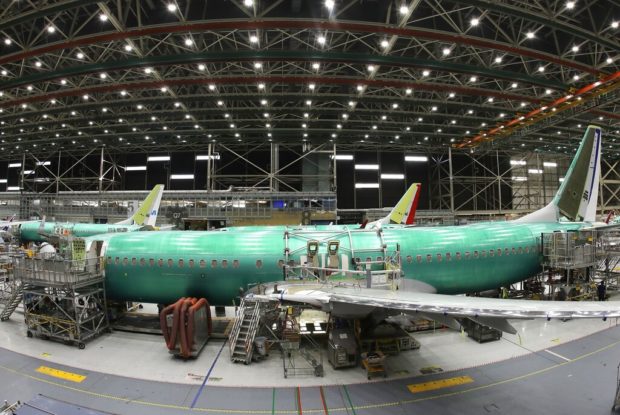
In this March 27, 2019, file photo, a Boeing 737 MAX 8 airplane is shown on the assembly line during a brief media tour in Boeing’s 737 assembly facility, in Renton, Washington. (AP)
DUBAI, United Arab Emirates — Boeing’s campaign to restore the reputation of its best-selling plane after two deadly crashes suffered a blow with a Saudi airline canceling an order worth up to $5.9 billion in favor of a European rival of the U.S. manufacturer.
Flyadeal, the budget airline arm of Saudi Arabian Airlines Corp., ordered 30 A320neo jets from Airbus and took options on 20 more, meaning that its entire fleet will consist of planes from that company.
It’s a potentially troubling sign for Boeing, which has not seen customers divert orders to Airbus en masse.
A small number of airlines have threatened to cancel 737 Max orders since crashes off the coast of Indonesia and in Ethiopia killed 346 people. The Max has been grounded since March.
Officials with Indonesia’s Garuda said in March that they were canceling the remaining 49 of a 50-jet Max order. Published reports suggest the airline and Boeing are in talks, however, and Boeing still lists the last 49 Garuda orders on its website.
Similarly, the owner of Lion Air — the Indonesia airline whose Max jet was involved in the first fatal crash in October — vowed to cancel. Boeing still lists the airline’s 187 unfilled orders as active.
Middle Eastern carriers Flydubai and Oman Air have threatened to switch to Airbus.
Flyadeal did not mention Boeing in its weekend announcement and did not disclose financial terms of the Airbus order, although the list price of the planes is about $5.5 billion. Carriers rarely pay list prices.
Flyadeal said the Airbus agreement emerged from last month’s Paris Air Show.
A Boeing spokesman said Monday that the company does not discuss customer decisions.
Boeing got a boost at the Paris Air Show when the parent company of British Airways and Spain’s Iberia said it intends to buy another 200 Max planes. The CEO of International Airlines Group, Willie Walsh, said he was confident the plane would make a successful return.
Boeing disclosed in April that it has booked about $1 billion in charges related to fixing the plane. Analysts expect that to rise sharply.
Dozens of lawsuits have been filed by families of those aboard the downed planes. Boeing will likely have to compensate airlines that already own Max planes — nearly 400 around the world — which are not expected to be allowed in back into the air any time soon.
The company suspended deliveries of new planes in March but has kept the assembly line open at a reduced production rate.
Though other planes have overcome passenger fears about safety, it is uncertain how passengers will feel about getting back on board a Max. Various surveys have indicated passenger reluctance.
Preliminary investigations in Indonesia and Ethiopia point to new software that pushed down the nose of planes in response to faulty readings by a single sensor on each plane. Boeing is making the software less powerful and connecting it to a second sensor, but engineers have encountered setbacks.
Pilots with the Federal Aviation Administration discovered a new flaw last month while testing updated software in a flight simulator, pushed back Boeing’s timetable. It now hopes to submit a final application to the FAA in September.
Boeing marketed the Max as an aircraft with more seats and lower operating costs than the Airbus neo. Boeing still has more than 4,500 unfilled orders for the Max. Customers, including three of the four largest U.S. airlines, have given no hint that they plan to nix orders from Boeing.
Boeing announced in December — six weeks after the first crash — that flyadeal had agreed to buy 30 planes with options for 20 more in a transaction valued at up to $5.9 billion. That figure did not include steep discounts typically given to carriers.
On Monday, the Chicago company said that it is proud of its long partnership with Saudi Arabia’s aviation industry.
“We wish the flyadeal team well as it builds out its operations,” Boeing said. “Our team continues to focus on safely returning the 737 Max to service and resuming deliveries of Max airplanes.”
Boeing CEO Dennis Muilenburg has apologized for the loss of lives and vowed to make the plane safer. Last week, Boeing announced an “initial investment” of $100 million over several years to help families and communities affected by the crashes. That fund is unrelated to any potential losses from lawsuits filed by the families of victims.
Boeing shares fell almost 2% Monday.
While the company’s stock is still up more than 8% this year, shares have dropped more than 20% from their peak in early March, shortly before the second deadly accident involving a Max.

